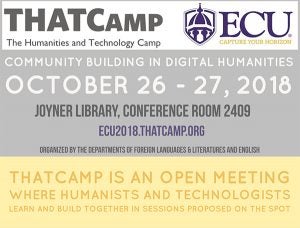The Humanities and Technology Camp

On October 26th and 27th 2018 the First THATCamp ECU 2018: Community Building in DH @ East Carolina University in Greenville, NC took place.
What is a THATCamp?
 THATCamp stands for “The Humanities and Technology Camp.” It is an unconference: an open, inexpensive meeting where humanists and technologists of all skill levels learn and build together in sessions proposed on the spot. An unconference is to a conference what a seminar is to a lecture, what a party at your house is to a church wedding, what a pick-up game of Ultimate Frisbee is to an NBA game, what a jam band is to a symphony orchestra: it’s more informal and more participatory. Here are the key characteristics of a THATCamp:
THATCamp stands for “The Humanities and Technology Camp.” It is an unconference: an open, inexpensive meeting where humanists and technologists of all skill levels learn and build together in sessions proposed on the spot. An unconference is to a conference what a seminar is to a lecture, what a party at your house is to a church wedding, what a pick-up game of Ultimate Frisbee is to an NBA game, what a jam band is to a symphony orchestra: it’s more informal and more participatory. Here are the key characteristics of a THATCamp:
- It’s collaborative: there are no spectators at a THATCamp. Everyone participates, including in the task of setting an agenda or program.
- It’s informal: there are no lengthy proposals, papers, presentations, or product demos. The emphasis is on productive, collegial work or free-form discussion.
- It’s spontaneous and timely, with the agenda / schedule / program being mostly or entirely created by all the participants during the first session of the first day, rather than weeks or months beforehand by a program committee.
- It’s productive: participants are encouraged to use session time to create, build, write, hack, and solve problems.
- It’s lightweight and inexpensive to organize.
- It’s not-for-profit and either free or inexpensive (under $30) to attend: it’s funded by small sponsorships, donations of space and labor, and by passing the hat around to the participants.
- It’s small, having anywhere from 25 or 50 to about 150 participants: most THATCamps aim for about 75 participants.
- It’s non-hierarchical and non-disciplinary and inter-professional: THATCamps welcome graduate students, scholars, librarians, archivists, museum professionals, developers and programmers, K-12 teachers, administrators, managers, and funders as well as people from the non-profit sector, people from the for-profit sector, and interested amateurs. The topic “the humanities and technology” contains multitudes.
- It’s open and online: participants make sure to share their notes, documents, pictures, and other materials from THATCamp discussions before and after the event on the web and via social media.
- It’s fun, intellectually engaging, and a little exhausting.